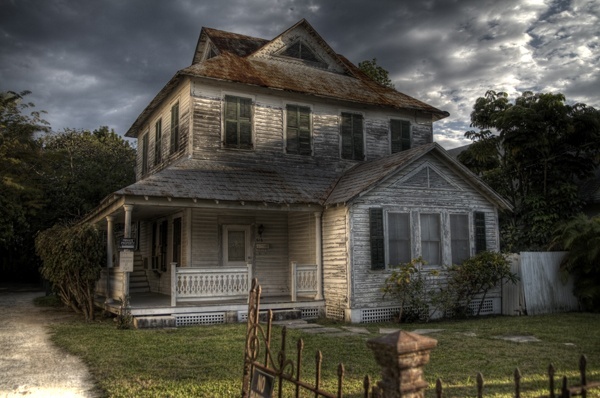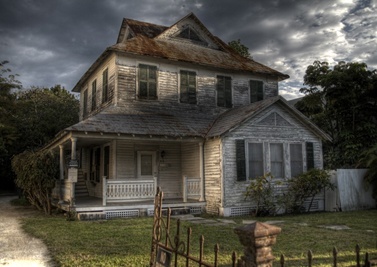
L
ast July, I was an artist-in-residence at a foundation in Key West, living communally with three other artists in the Old Town. We each had cottages that overlooked a sculpture garden. An article about us in the local paper described the residency as a chance to “live in paradise.”
At first, it was just that.
On my third night in Key West, the sounds started. I was reading in bed. I heard footsteps on the porch, just outside my window, followed by a rustling in the bushes along the side of the cottage. I got up and looked out the window. I checked to make sure the doors were locked. I got back into bed.
Next I heard a piercing cry—not exactly speech, but unmistakably human. More footsteps, more rustling, and then the sound of someone moving across the gravel path that snaked around the back of the cottage. I checked outside again, but found nothing. I kept the bedroom lights on and stayed awake until the blinds were aglow with sun.
I am a Florida native. From my childhood I remember: Gatorland, tube slides in water parks that seemed to last forever, highways, strip malls, regular malls, chain restaurants, 7-11 Slurpees that made my tongue electric blue, hurricanes, sunburns, golf courses, alligators, lizards, snakes, heat.
Sometimes people ask me if I think Florida is the South. “I have no idea!” I tell them. My mother, who hails from Nashville, would say Florida is not the South, not at all. “What is it then?” you might reasonably ask my mother. “Swampy,” she might say.
Florida is hard to grasp because it is a state largely defined by its multitudes. North Florida, which borders Georgia and Alabama, can feel very much like the South. Central Florida is a sprawl of suburbs and theme parks and lakes. South Florida, Miami, the Everglades—different worlds entirely.
I grew up in Orlando, but I never identified with being a Floridian. At twenty-two, I moved to Boston for graduate school, and when someone asked me what I liked best about living in Massachusetts, I blurted out, “There are no lizards here!”
Despite all my years in Florida, I’d never been to Key West and found myself thinking about the thin fingers of land at the bottom of the state. Once I asked my father why we never took a family trip to the Keys and he told me a story about attempting to drive across the Seven Mile Bridge, which connects Miami to the Keys, and being so horrified by the gridlocked traffic, he turned around and never went back.
I traveled to Key West in a tiny plane, marveling at the clarity of the water below.
Every night, the sounds returned. I stayed up, terrified—once the noises were so violently loud, I hid in the shower—finally falling asleep for a few hours around six in the morning, when I felt I’d safely reached the shore of the coming day.
I was in Key West to work on my first novel. Was this a normal thing that happened to all novelists? I wondered.
I suspected not.
Fucking Florida, I thought more than once.
Have I mentioned how much I hate being afraid of anything ever?
Some people equate being a Floridian with having grown up near water, but Orlando is located in the center of the state, the beach an hour away. The water I remember is swimming pools: chlorine, diving boards, alligator-shaped floatees.
In Key West, I could walk to the ocean. When I stopped sleeping altogether, the ocean saved me. I relished the daily plunge from the pier into the water, the shock of awakeness.
Growing up in Florida trained me to be fearful of underwater things, but in Key West I would keep swimming out even after the ocean turned dark and cold.
One evening A., a fellow artist-in-residence, and I were having a drink when she confessed she’d been hearing noises so bizarre, she too was spending her nights in a state of terror. As it turned out, we were being plagued by the same sounds, at the same hour.
“I think it’s a ghost,” A. said.
“I hope it’s a ghost,” I said, joking at first, but then realized I meant it. The alternatives seemed worse.
Later we struggled to find the right language to describe the cry. We tipped our heads back and yipped. The other two artists, J. and V., arrived on the scene, plus a college student interning at the foundation. Together we talked everything over.
The sky was pink with sunset and already I was dreading the approach of night.
I can’t remember who suggested the ghost exorcism, but J. was knowledgeable about such matters and before long we’d gathered the necessary supplies: a bell, candles, kosher salt. An irrational solution to an irrational problem. In the haunted space, someone was to ring the bell in every room, while those impacted by the haunting held hands and announced what they wanted the spirit to do. Afterwards we were supposed to sprinkle salt on all the thresholds and burn candles through the night.
J. rang the bell. We started at A.’s, moving from room to room, hands clasped. After each chime of the bell, we asked the ghost to let us be. Eventually we moved on to my cottage and after the ringing and the declarations were over, we left white lines of salt on the windowsills and doorways. We lit candles, then receded into our separate quarters, anxious for what the night would bring.
This time, the darkness brought nothing. In Key West, we never again heard a sound at night.
I’ll never know for sure what we were hearing. Maybe it was a ghost. Or someone playing a trick. Or imaginations gone haywire. In the end, it doesn’t matter. The noises stopped. I started sleeping again.
When I think back on the night of the casting out, I am struck by the intimacy. The damp heat of A.’s palm. The collective sound of our voices. The way we were all invested in the problem of this ghost.
Even though I was living under the umbrella of a foundation, I was still spending a lot of time alone. I wrote alone. I went to bed alone. I feared the inexplicable nighttime noises alone. I walked alone, swam alone. Always this kind of aloneness makes me more attentive. In Key West, I noticed the wild roosters in the palm trees, the seawall laced with purple algae, the dark, mountainous clouds that appeared before a storm. I noticed Florida. What a strange and troubled and occasionally magical place. What a place to have come from. In hindsight I suspect I was attracted to Key West, to this unfamiliar spot in a familiar state, because it was a chance to have my relationship to Florida be redefined.
When I arrived in the Keys, I assumed Florida had nothing new to show me.
I was wrong and I should have known better: a state best defined by its multitudes suggests a place that always, for better or for worse, has the capacity to surprise.
In Key West, I learned that if you encounter a shark while snorkeling, chances are it’ll just swim on by. If you get stung by a jellyfish, pour vinegar on the wound. In Mallory Square, I learned it’s possible to ride a unicycle and juggle fire at the same time. At the Hemingway House, I learned there is a cat cemetery with departed felines named after movie stars—Betty Davis, Errol Flynn. I learned Key West had a place in the novel I was there to work on and writing about the landscape of Florida while in Florida is the most Floridian I have ever felt before or since.
In Key West, I learned how to get rid of a ghost.

